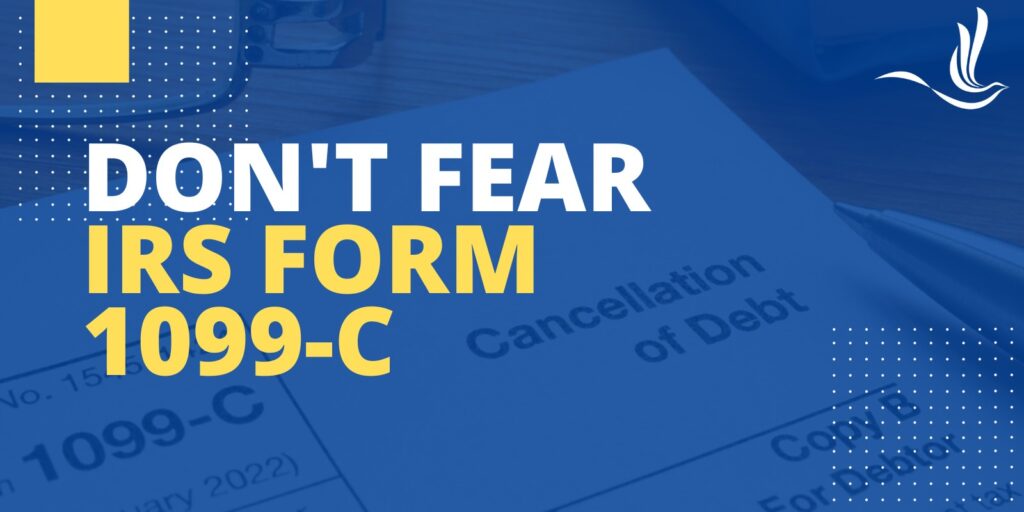
Perhaps the most feared and least understood document ever published by the IRS is Form 1099-C, Cancellation of Debt. Form 1099-C is sent to people who were so deep in debt, their creditors agreed to give them a break. They do this by either reducing or cancelling their debt altogether. Think foreclosures, short sales, credit card debt settlements, and similar debt consolidation methods. The issue is that in the eyes of the IRS the cancelled debt has not disappeared. Instead, it has transformed into a new source of taxable income: debt income.
Why Do You Have to Pay Taxes on Cancelled Debt?
If you have received an IRS Form 1099-C, your first reaction was probably disbelief. It does seem counterintuitive to have to pay taxes on cancelled debt. However, the IRS’s response is that when you borrowed that money you did not have to pay taxes on it because you were bound by contract to pay it back. If you had repaid the debt, it would have been as if you had never really owned the money. However, when a creditor releases you of a liability, you are in effect receiving a payment you did not return. This is a definition of income.
1099-C Disputes
Creditors who cancel a debt of $600 or more are required by law to report the amount of debt discharged to the IRS by filing a 1099-C and sending a copy to the debtor. It’s worth mentioning that these creditors can make errors on these forms. If you disagree with the amount on the form, you need to contact the creditor and request a correction. The creditor‘s address and telephone number should be on the top of the form. If it turns out the creditor made a mistake, they can issue a new 1099-C with the correct information.
Discrepancies and Tax Audits
It is worth highlighting that the IRS also receives a copy of the information on your 1099-C. If you fail to report taxable debt income when you file your taxes, you may have to pay an additional negligence penalty. You also need to pay interest on your taxes, as well as other sanctions.
If you do not agree with the debt income amount and you cannot resolve the issue with the creditor, things get tricky. You can make a note in your tax return. However, discrepancies between your tax return and 1099-C forms, even when accompanied by explanatory notes, are tax audit magnets. Therefore, you should prepare yourself and expect the IRS to want a closer look at your accounts.
Exceptions and Exclusions
Not all types of unpaid debts are taxable. In addition, you may qualify for exclusions that could either reduce or even cancel your tax liability. IRS Publication 4681, Canceled Debts, Foreclosures, Repossessions, and Abandonments (For Individuals), discusses the subject of debt income exceptions and exclusions in detail. If you qualify for any of these exceptions, you need to fill in and attach IRS Form 982, Reduction of Tax Attributes Due to Discharge of Indebtedness, to your form 1040.
Some examples of exceptions and exclusions include:
- Gifts. Debts canceled as a gift, a bequest or as part of an inheritance are generally not considered income.
- Student Loans. Student loans cancelled in exchange for meeting certain requirements, student loan repayment help programs, student loan cancellation from 2021 through 2025.
- Bankruptcy: Debts canceled during a title 11 bankruptcy are excluded from gross income. To prove debt income reported in a 1099-C was discharged as part of a bankruptcy, complete and attach Form 982 to your tax return and make sure you check the box on line 1a.
- Insolvency. If your debts were cancelled due to insolvency – because your debts were greater than your total assets – some or even all of your cancelled debt may not be taxable. For instance, if your total assets amounted to $10,000 and your total debt was $15,000, you may not have to pay taxes on debt income of $5,000 or less. If you were insolvent when your debt was forgiven, check box 1b in Part 1 of Form 982 and attach it to your tax return. Form 982 includes an insolvency worksheet to help determine how much of the debt you can exclude.
- Principal Residence. If the cancelled debt was on your principal residence, you can exclude up to $750,000 of the debt. You can exclude up to $375,000 if married filing separately. Mind you, this does not apply to investment or vacation homes.
Don’t Panic, You May Be Exempt
If you receive a 1099-C Form, try not to panic. You may be exempt from paying taxes on the debt income. If not, you probably can exclude a big chunk of it. However, negotiating debt income matters with creditors and the IRS is a complex matter. Hiring a tax professional with experience in debt income cases may save you a lot of cash, time and stress. Consider hiring a qualified tax advisor with experience in debt income matters. They might be able to determine whether your cancelled debt is taxable, how much you can exclude, and how to manage negotiations with creditors. Optima Tax Relief is the nation’s leading tax resolution firm with over $1 billion in resolved tax liabilities.
If You Need Tax Help, Contact Us Today for a Free Consultation